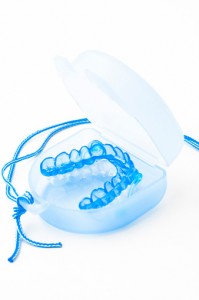Everything You Need to Know about Teeth Grinding

Why Does Teeth Grinding Happen?
Usually, teeth grinding happens subconsciously, and often during sleep. It can be a sign of stress or anxiety, or an indication of a poor bite or misaligned teeth. It can also happen for no particular reason. Often, it is hard to tell if you are grinding your teeth at night, but there are a few telltale signs – if you wake up in the morning with a headache or jaw ache, bruxism may be the cause. Sometimes, your partner may hear you grinding your teeth at night, which may be the first indication of the problem.
What Problems Arise from Teeth Grinding?
Besides causing headaches and jaw aches from muscular tension, teeth grinding wears down the surfaces of the teeth, causing a host of other problems to arise. Cavities and infections can all occur when the teeth become worn excessively, and these problems will need to be treated with bridges, crowns, implants, or other procedures. Grinding also causes temporomandibular disorders, commonly known as TMJ issues, in which the jaw muscles and joints become inflamed or misaligned. When problems arise from teeth grinding, your dentist will be able to offer treatment for the symptoms, and will likely make suggestions for learning not to grind your teeth.
How to Stop Grinding Your Teeth
One of the most common preventative measures for teeth grinding is to be fitted for a mouth guard. A mouth guard helps to protect your teeth at night, and can also retrain you to stop grinding. If the grinding is caused by stress, consider taking measures to reduce stress such as counseling, exercise, or physical therapy. There are a few other measures you can take that may help you avoid grinding. Avoiding caffeine and alcohol can help, as both can cause an increase in teeth grinding. Try not to chew on objects like pencils or pens, as this trains the jaw to clench and become tight. Chewing gum has the same effect, and should be avoided. If you clench your teeth during the day, try placing the tip of the tongue between the teeth to make the jaw relax. You can also try placing a warm washcloth or hot pack on your jaw before you go to bed to relax the jaw muscles.
If you suspect that you are grinding your teeth, talk to the dentists at California Dental Group. They will examine your teeth for the signs of bruxism, and can offer advice and treatment.




